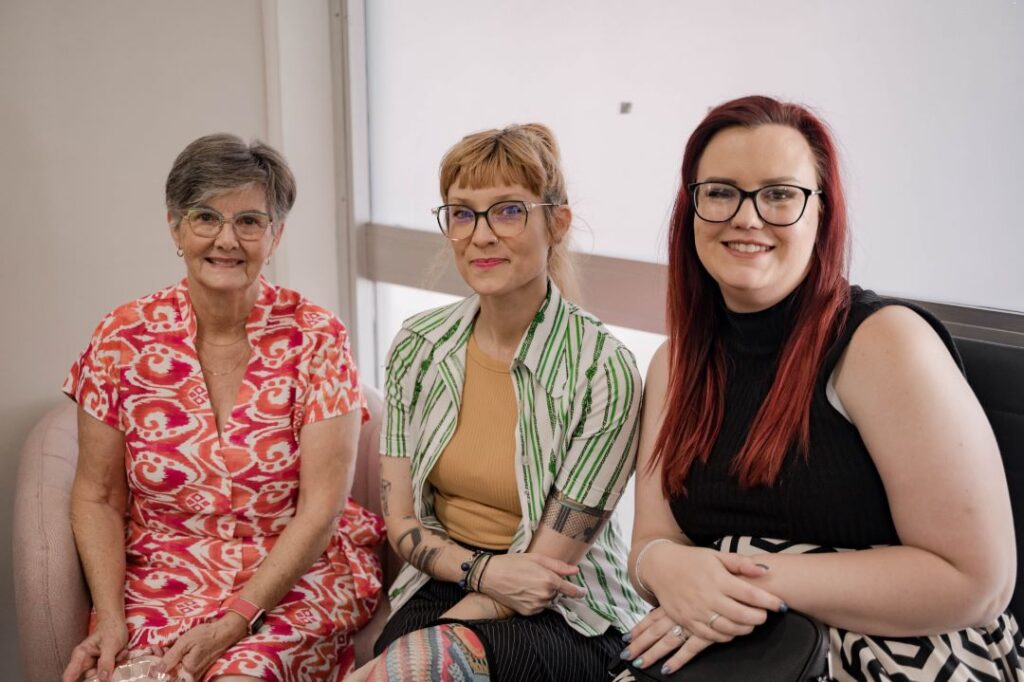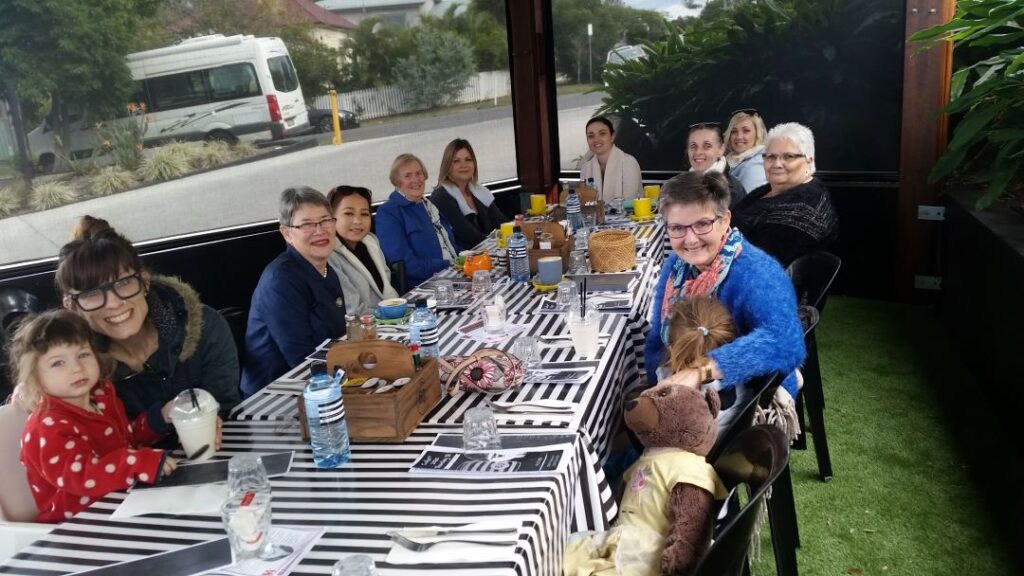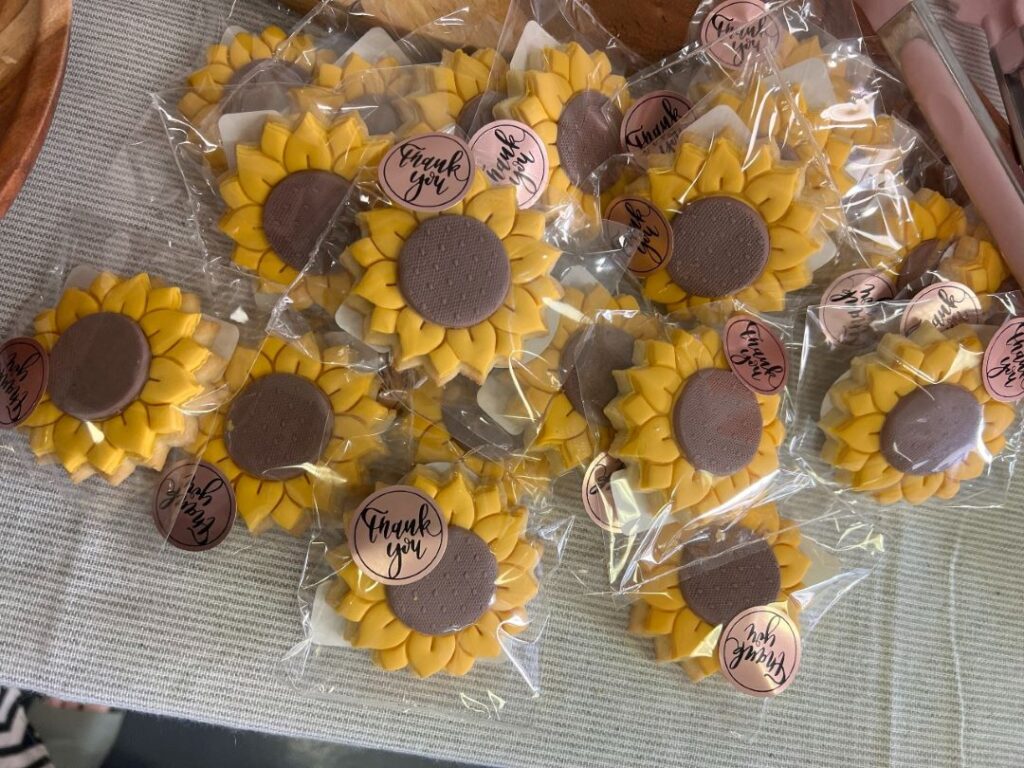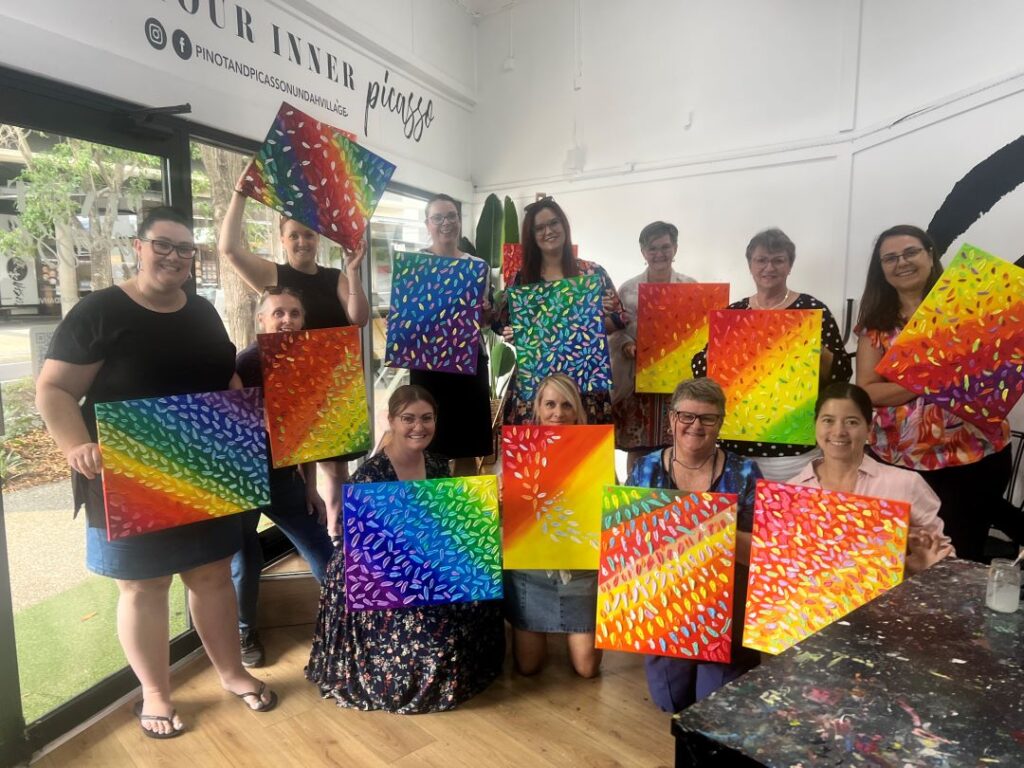Lauren Green, Haemophilia Foundation Queensland Manager, spoke to Suzanne at HFA about HFQ’s work to develop peer support for women.
Growing up with haemophilia in the family, Lauren had been associated with Haemophilia Foundation Queensland (HFQ) since she was a little girl, but it wasn’t until she received a diagnosis herself that she became more aware of the needs of women and girls.
‘My brother was diagnosed with haemophilia when he was 11 months old and my parents were on the HFQ Board. Genetic testing for our family mutation wasn’t available until I was in my mid-20s and it was only then that I was formally diagnosed.
‘After that I was having lots of conversations in my roles on the Board with women who were having bleeding issues but didn’t have an official diagnosis. It was just something that wasn’t talked about because it was classed as “women’s issues” and swept under the rug.’

Lauren (right) with women members
HFQ decided to hold an activity that was open to any women affected by a bleeding disorder, whether they had a bleeding disorder, were a carrier, parent or partner. It was a morning tea at a local café and was so successful that it has continued quarterly over the last 7 years.
‘We just called it “women’s brunch” to keep it simple and informal.
‘Part of the thinking with “women’s brunch” was to have the women focus on themselves. We had run carers workshops. I wanted it to be a really relaxed environment so that women could open up but also give them a break from their caring role, if that’s what they were in, or being a parent. To have a moment to talk to other people in the same situation in a non-clinical setting.’

In a comfortable informal environment, the conversations were open and provided good opportunities for peer support and education.
‘The women were saying “oh, I just thought it was just a heavy period, I thought it was normal to have nosebleeds all the time.” Then we found that in having the conversations with women who were deemed “just a carrier” or had a child with haemophilia but hadn’t been tested themselves, that they were going and getting tested and finding out that they had low factor levels.’
HFQ has tried a few different types of activities to engage and support women:
Workshop-based activities rather than a sit-down lunch every 6 months.
‘These are fun activities that encourage a wider group of women to attend and different conversations – and are generally types of activities that appeal more to women than men.
For example, paint & sip – having a drink and a cheeseboard while an artist teaches you how to make a textured painting on a canvas. We are thinking of candle-making for our next activity.
‘It’s such a relaxed environment that conversations happen organically. So, women would start conversations about what’s your connection and then share experiences of bleeding.
‘We had a lot of women come to the workshop activity who wouldn’t normally come to the brunches because it might be a little threatening if you were new to the community or you haven’t been to one before. There have been a lot of connections made in those sessions and then women talk again outside the session and have that peer support.’
Massages at community camps are popular with women to relax and also give them personal time separately from their children.
‘A lot of women take the massages up and then come out and have a chat to us afterwards.’
Carer lunches where the carers are provided with support to care for the person with a bleeding disorder while they are at lunch.
‘The carer lunches are really great for the women who just don’t get a break. They have a child or a partner with haemophilia and they are in that caring role constantly, which can be quite draining, so we give them an opportunity to have some time to themselves and be guilt free.’
What makes an activity more women-friendly? Lauren shared her thoughts:
‘We usually run the activities on Sundays mid-morning to lunchtime because a lot of the women are mums and their kids have sport on Saturdays. And if they are working, we don’t want to exclude them.’

The conversations at the women’s peer support activities have had a very noticeable impact on women’s understanding of their bleeding, and many have now followed up with diagnostic testing for a bleeding disorder.
Lauren reflected that women often struggled to discuss their bleeding in other environments. It’s a common sentiment among males that gynaecological discussions are too much information and they ‘don’t want to know about that’, sometimes even in bleeding disorders community groups or in women’s own family.
HFQ activities have been developed to offer private spaces and small break-away groups so that women are not as self-conscious about discussing personal issues.
Conversations about bleeding are often started by more confident community leaders such as Lauren.
‘Women are more comfortable talking about their periods and bleeding with other women. I will openly talk about it to start the conversation. I’ll talk about my experience with childbirth or with my periods before I was diagnosed compared to now that I have treatment. And that gets rid of the awkwardness.
‘The open discussions have removed the stigma for a lot of women, especially the older ones, who said we just didn’t talk about periods or bleeding. It was so taboo you just didn’t discuss it and you certainly didn’t go to the doctor about it. They are saying now, “I wish I had been to a doctor and I am telling the younger generations that’s not normal, that’s what I was like. It’s probably a genetic thing, go and get tested.”’
‘Most women think they just have to keep going and tough it out with all their existing commitments in spite of their bleeding – with their partner, their family, their work. And if you are having a conversation I can say, yes that was me, but then I went to see the haematology team and now I’ve got treatment and I’ve got so much more energy because I’m not iron deficient every month. I’m not having all these struggles. I can live pretty much a normal life.’
Messages are clear and simple:
‘I know you’re in a caring role for your child, but your health matters too.’
‘It’s OK go to a doctor if your bleeding isn’t normal. You’re not alone – this is happening to a lot of women.’

Displaying the results of the women’s paint ‘n sip activity
The women’s peer support groups are also a good opportunity to give women the skills and the tools to educate the other health professionals who care for them and may need to be aware of their bleeding disorder.
‘We have the informal conversations first, then give women the HFA Female Factors booklet and the links to all the HFA information. We also point them to the Let’s Talk Period self-assessment tool, which is a really good resource from Dr Paula James in Canada for showing what’s not normal and when to see your GP.
‘One of the hardest things is educating your other health professionals – your GP, emergency workers, the ones you are more likely to come across than your haematology team, unless you’re having major issues.
‘I also have a lot of conversations with women about when you are talking to your GP, make sure you are educating them as much as you can. Frontline workers can’t know everything. And there hasn’t been a lot of education for GPs and specialists on how women bleed, even now.’
Using tools like the ABDR Patient Card/emergency card can be valuable and HFA education resources can help to explain and support the women’s experience. GP education sessions, like those run by the Queensland HTC, are also important for getting the message out more widely among health professionals – HFQ sponsors these and are invited to give a presentation on the personal perspective of living with a bleeding disorder.
Thanks to Lauren for sharing her experiences of women’s peer support activities.
Photos supplied by HFQ and reproduced with permission.
Visit the HFA website www.haemophilia.org.au to:
Haemophilia Foundation Australia acknowledges the Traditional Owners and Custodians of Country throughout Australia, the land, waters and community where we walk, live, meet and work. We pay our respects to Elders past and present and extend that respect to all Aboriginal and Torres Strait Islander peoples.
Sign up for the latest news, events and our free National Haemophilia magazine